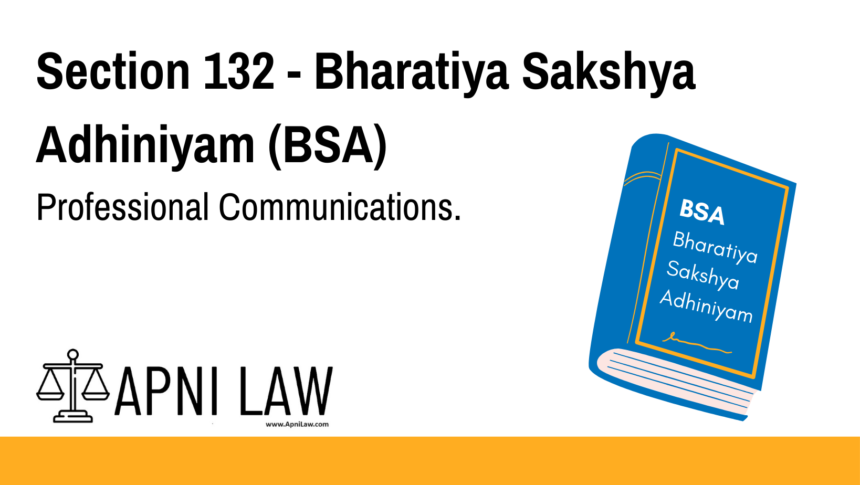Code: Section 132 BSA
(1) No advocate, shall at any time be permitted, unless with his client’s express
consent, to disclose any communication made to him in the course and for the purpose of
his service as such advocate, by or on behalf of his client, or to state the contents or
condition of any document with which he has become acquainted in the course and for the
purpose of his professional service, or to disclose any advice given by him to his client in
the course and for the purpose of such service:
Provided that nothing in this section shall protect from disclosure of—
(a) any such communication made in furtherance of any illegal purpose;
(b) any fact observed by any advocate, in the course of his service as such,
showing that any crime or fraud has been committed since the commencement of his
service.
(2) It is immaterial whether the attention of such advocate referred to in the proviso to
sub-section (1), was or was not directed to such fact by or on behalf of his client.
Explanation.—The obligation stated in this section continues after the professional
service has ceased.
Illustrations.
(a) A, a client, says to B, an advocate—”I have committed forgery, and I wish you to
defend me”. As the defence of a man known to be guilty is not a criminal purpose, this
communication is protected from disclosure.
(b) A, a client, says to B, an advocate—”I wish to obtain possession of property by
the use of a forged deed on which I request you to sue”. This communication, being made
in furtherance of a criminal purpose, is not protected from disclosure.
(c) A, being charged with embezzlement, retains B, an advocate, to defend him. In the
course of the proceedings, B observes that an entry has been made in A’s account book,
charging A with the sum said to have been embezzled, which entry was not in the book at
the commencement of his professional service. This being a fact observed by B in the
course of his service, showing that a fraud has been committed since the commencement of
the proceedings, it is not protected from disclosure.
(3) The provisions of this section shall apply to interpreters, and the clerks or
employees of advocates.
Explanation of Section 132 BSA
Section 132 of the Bharatiya Sakshya Adhiniyam (BSA) defines the confidentiality between an advocate and their client. It states that an advocate is prohibited from disclosing any communication made by the client, including documents and advice, unless the client explicitly consents. This ensures that the attorney-client privilege remains intact.
However, the section does not protect communications made for illegal purposes or facts that reveal a crime or fraud committed during the course of the advocate’s service. The section applies not only to advocates but also to interpreters and clerks employed by advocates, extending this privilege to those working in a legal capacity.
Illustrations
Example 1: Defence in a Legal Matter
A, a client, tells B, an advocate, “I have committed forgery, and I wish you to defend me.”
As the defence of a person known to be guilty is not considered a criminal purpose, this communication is protected from disclosure.
Example 2: Illegal Purpose
A, a client, tells B, an advocate, “I wish to obtain possession of property through a forged deed and request you to sue.”
Since this communication is made to further a criminal purpose, it is not protected from disclosure under this section.
Example 3: Discovery of Fraud
A, charged with embezzlement, hires B, an advocate, to defend him. During the proceedings, B observes that an entry in A’s account book, indicating the embezzled sum, was made after the advocate began his professional service.
Since this fact reveals a fraud committed during the advocate’s service, it is not protected from disclosure.
Common Questions and Answers on Section 132 BSA
1. Can an advocate disclose information shared by a client?
- Answer: No, unless the client explicitly consents, an advocate cannot disclose any communication made in the course of their professional service.
2. Does Section 132 protect communications made for illegal purposes?
- Answer: No, communications made in furtherance of illegal activities are not protected from disclosure under Section 132 BSA.
3. Does this section apply to anyone working with the advocate?
- Answer: Yes, the provisions of Section 132 BSA extend to interpreters, clerks, and employees of advocates as well.
4. How long does the confidentiality last?
- Answer: The obligation of confidentiality continues even after the professional service has ended, meaning the advocate cannot disclose the information even after the client-advocate relationship has ceased.
Conclusion
Section 132 of the Bharatiya Sakshya Adhiniyam (BSA) upholds the principle of confidentiality in legal relationships, ensuring that advocates cannot disclose information shared by their clients unless consented to. However, this protection is not absolute and does not cover communications made in furtherance of criminal activities or any fact observed by the advocate revealing a crime or fraud. The section’s provisions are broad, extending to all individuals working in a legal capacity such as interpreters and clerks.








